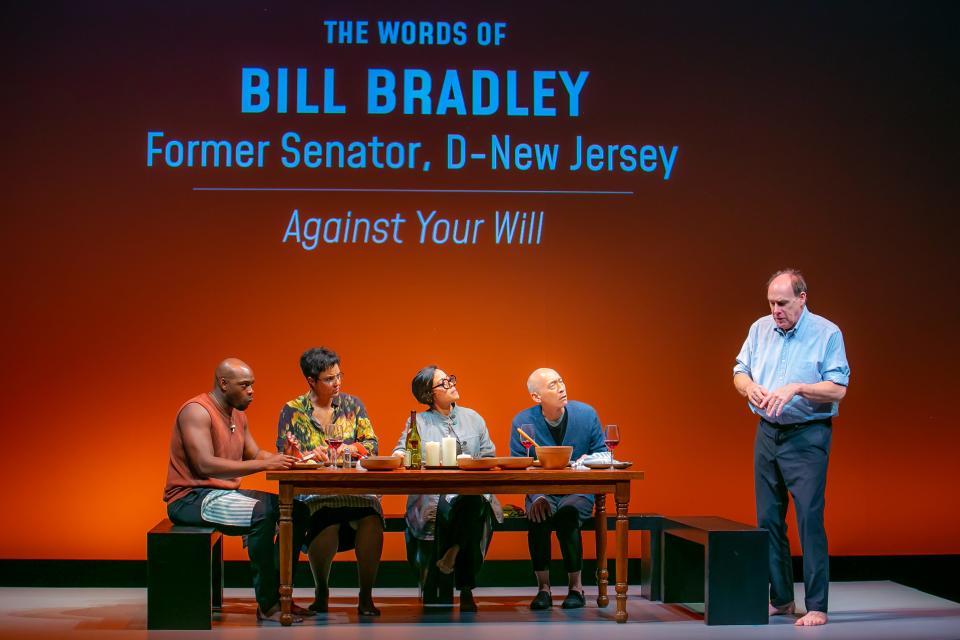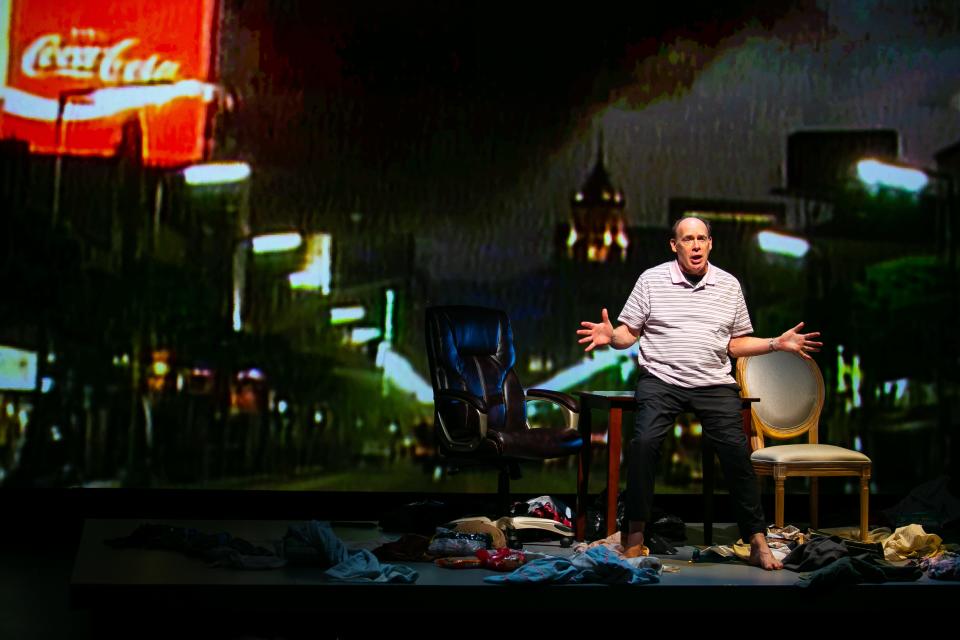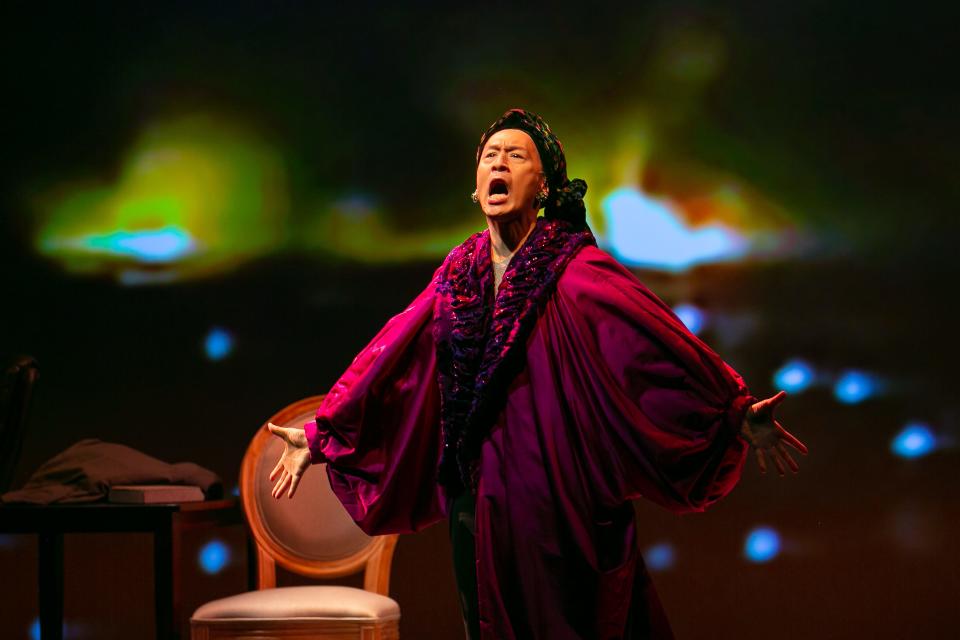Revisiting Anna Deavere Smith's 'Twilight: Los Angeles 1992,' A.R.T. offers powerful look at racism then and now
- Oops!Something went wrong.Please try again later.
- Oops!Something went wrong.Please try again later.
The show: "Twilight: Los Angeles 1992”
Conceived, written and revised by: Anna Deavere Smith; directed by Taibi Magar; presented by American Repertory Theater in Cambridge in association with Signature Theatre in New York City
What it’s about: Described as “a stirring cry for reform,” this is Smith’s Obie Award-winning and Tony Award-nominated play from nearly three decades ago that she has reimagined from her one-woman performance to a play for five actors. She created the piece after conducting more than 350 interviews with people in Los Angeles after the days of riots triggered by news in 1992 of the acquittal of police officers who had beaten Rodney King, who was Black.

Smith tried to dissect the civil unrest then, and came back to the play in light of the 2020 murder of George Floyd and later conviction of former Minneapolis police officer Derek Chauvin. A coda to the piece reflects on the two police brutality cases and their similarities and differences.
“At this time in America, we are thinking about why we can’t find a way to belong together, and I think we have a chance given the larger conversation in the world and the political conversation in the world right now to put the play against a modern background and see if there are new things to learn,” Smith has said. She has asked us to consider what has happened in the 30 years since — and what has not.
See it or not: “Twilight” is a fascinating, thought-provoking, often disturbing, sometimes humorous look at the pivotal 1991 King beating, the police brutality acquittal and the riots that followed — killing 64 people, injuring more than 2,300 and causing more than $1 billion in economic costs. The play also shows us the wider implications of the racism and aftermath that affected both Black and Korean neighborhoods in Los Angeles. Some prior knowledge of the King case is helpful for a deeper experience, but all audience members will undoubtedly find perspectives they hadn’t known or considered.

Highlights of the show: Excerpts of Smith’s interviews are re-created verbatim from a wide variety of people: male, female; child to senior citizen; several races and ethnicities; those involved with the King case and ordinary residents/observers. Their words and the outstanding portrayals by the exceptional cast create memorable characters from these long-ago voices. Those range from King’s aunt to the L.A. police chief, a liquor store owner to a real-estate broker, politicians and actor Charlton Heston, and multiple people caught in the riots.
All of the actors are excellent in using and changing voice, accent, mannerisms and clothing to morph from one person to the next, sometimes in astonishingly quick succession. Tiffany Rachelle Stewart and Frances Jue particularly stand out for bringing memorable, moving and so-different characters to life. Stewart’s include a juror in the later federal trial, King’s aunt, a pregnant woman shot during the riots and Congresswoman Maxine Waters. Jue’s include a weapons specialist, opera singer Jessye Norman, an injured businessman and his son, and a pastor.
Fun fact: While watching this quintet — which also includes the wonderful Elena Hurst, Wesley T. Jones and Carl Palmer — it’s astonishing to think that in the original version of this play, Smith portrayed all of these diverse characters herself. The writer/actress, who created this unusual blend of journalism and performance, received a National Humanities Medal from President Obama in 2013 and has worked previously with A.R.T. for her “Fires in the Mirror,” “Let Me Down Easy” and “Notes from the Field: Doing Time in Education.”

Worth noting: Magar’s direction is enormously effective, both in quickly and clearly moving between characters and in making the few group scenes — particularly “A Dinner Party that Never Happened” that comments on the importance of people gathering together to talk, and a look inside the juror debate of the subsequent federal trial related to King — among the best scenes of the show.
One more thing: The production designers are vital to the success of this storytelling, particularly the vivid projection design by David Bengali. The backdrops are telling and eerie, and the videos on a giant back screen and two side screens bring the audience into the anger, desperation and horror of the riots. Key video of the beating of King, the killing of teen Latasha Harlins shortly after, and the rescue of white man Reginald Denny by four Black good samaritans are hard to watch, but searing.
If you go: through Sept. 24 at the Loeb Drama Center, 64 Brattle St., Cambridge; https://americanrepertorytheater.org/. Through donations, A.R.T. has made 1,500 tickets priced at $5 and 1,000 free tickets available for public high school students to “help lower the economic barrier to attending theater, activate civic engagement in young people, and underscore the importance of civilized dialogue in creating a more equitable society.”
Contact Kathi Scrizzi Driscoll at kdriscoll@capecodonline.com. Follow on Twitter: @KathiSDCCT.
This article originally appeared on Cape Cod Times: Theater: Anna Deavere Smith 'Twilight: Los Angeles 1992' racism look

